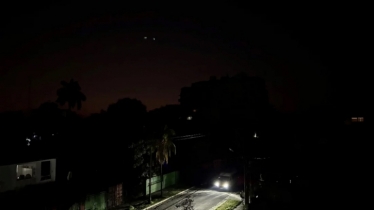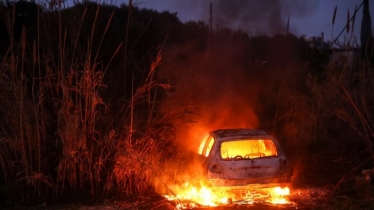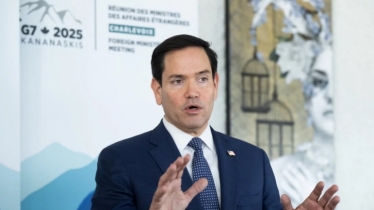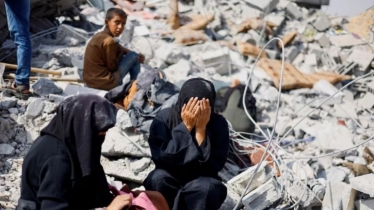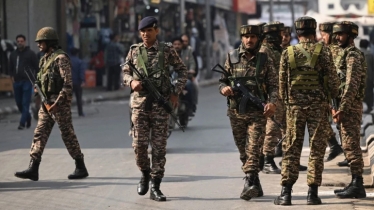
AFP, BEIRUT: Thousands of Lebanese prepared Saturday for a major protest against a political leadership they blame for a monster explosion that killed more than 150 people and disfigured the capital Beirut. Two days after a landmark visit by French President Emmanuel Macron, diplomatic activity intensified in Beirut to organize international support for the disaster-hit country ahead of a Sunday aid conference.
For the fourth day running, Beirut woke up to the sound of broken glass being swept on the streets, its inhabitants still taking stock after one of the biggest blasts of its kind in recent history.
A fire at Beirut port on Tuesday ignited a stock of ammonium nitrate and triggered an explosion that was felt in neighboring countries and destroyed entire neighborhoods of the city.
Spectacular videos of the disaster show a mushroom-shaped shockwave that drew comparisons with the 1945 atomic bombs on Japan while foreign rescue teams compared the devastation with earthquake scenes.
Saturday could be the last day anybody buried under rubble has any chance of being found alive and according to the health ministry, more than 60 people are still missing.
The Netherlands announced Saturday that its ambassador’s wife was among the 154 people confirmed to have died in the tragedy.
Solidarity for the victims of the blast, from inside and outside Lebanon, has been impressive but this disaster was man-made and residents want heads to roll.
The president and prime minister of Lebanon have promised that a government investigation would net the culprits but, more than a mere case of negligence, many Lebanese see the blast as a direct result of their leaders’ corruption.
“After three days of cleaning, removing rubble and licking our wounds... it is time to let our anger explode and punish them,” said Fares Halabi, a 28-year-old activist who planned to join a protest on Saturday afternoon.
Some people erected a mock gallows for Lebanon’s top politicians on Martyr’s Square, the epicenter of a protest movement that briefly rattled the country’s hereditary ruling class.
The lack of political change combined with a stinging economic crisis and the coronavirus pandemic all but snuffed out the revolutionary movement — until this week.
“Today is the first demonstration since the explosion, an explosion in which any one of us could have died,” said Hayat Nazer, an activist who has contributed to solidarity initiatives for blast victims.
“This is the biggest warning for everyone now that we don’t have anything to lose anymore. Everyone should be in the streets today, everyone,” she told AFP.
However some of Lebanon’s leaders seemed to consider the outpouring of international solidarity as an opportunity to break the government’s diplomatic isolation.
A virtual international donor conference launched by Macron, and in which US President Donald Trump and other top leaders will take part, is scheduled for Sunday.
Lebanon defaulted on its debt earlier this year and the current leadership has so far consistently failed to address the economic emergency and agree on an international rescue package despite intense Western pressure.
Speaking on Friday evening, President Michel Aoun said “the explosion has led to the lifting of the isolation.”
Hezbollah leader Hassan Nasrallah also said the disaster had created “an opportunity” to get the world to work with Lebanon again.
Three senior diplomats were in Beirut Saturday in a show of solidarity with the disaster-hit city, where 300,000 people were made temporarily homeless by the port explosion.
The first to meet top officials was Arab League chief Ahmed Aboul Gheit. Turkish Foreign Minister Mevlut Cavusoglu was also expected, as was the president of the European Council, Charles Michel.
“You are not alone,” Michel said after meeting Aoun, promising tangible assistance to the country but also stressing the need for more transparent governance.
Aoun however rejected calls backed by Macron for an international and independent investigation into the blast.
A total of 21 people have been detained so far, including Badri Daher, director-general of Lebanon’s customs authority.
Christian MP Samy Gemayel announced Saturday during a funeral service for his Kataeb party’s secretary general, who was killed in the explosion, that he and his two colleagues in parliament were resigning.
That brought to five the number of lawmakers who quit since the blast.
Few Lebanese seemed to have any trust that the leadership would incriminate its own in an investigation chaired by some of the country’s top officials.
Analyst Nasser Yassin of the Issam Fares Institute for Public Policy and International Affairs, said Lebanon’s reviled leaders were clearly seeking to take advantage of the situation.
“The fear is that the authorities will benefit from this great disaster and from the international and Arab attention they are getting,” he said.
Activist Hayat Nazer said the current crisis should not turn into a chance for the political elite to get a new lease of life but instead give fresh impetus to a drive for change.
“I think it’s the last wake-up call for people,” she said.

